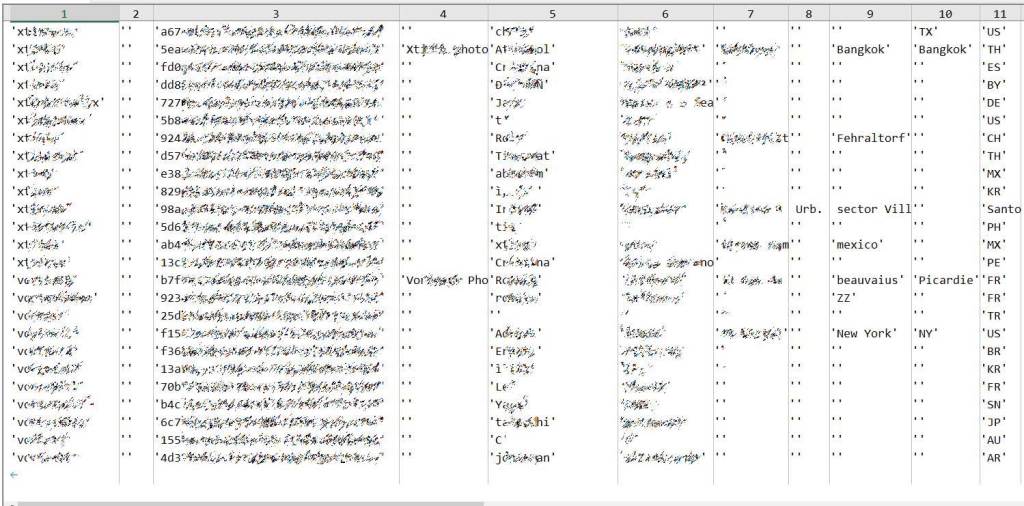The 123RF data breach is a significant incident that has raised concerns about online privacy and data security. With millions of users affected, understanding the implications of such breaches is crucial for anyone who uses digital platforms. This overview will delve into the details of the breach and provide insight into how data breaches can occur, equipping you with the knowledge to protect your personal information.
Understanding the 123RF Data Breach

The 123RF data breach was discovered when unauthorized access to user accounts and sensitive information came to light. Millions of users’ personal data, including names, email addresses, and potentially financial information, were exposed. The breach raised alarms regarding the security measures employed by data-driven companies and highlighted the need for stronger user protections.
When a data breach occurs, it often leads to identity theft and serious privacy violations for the affected individuals. Users may face unwanted emails, phishing attacks, and even fraudulent transactions as a result of their leaked information. Furthermore, this incident underscores the broader implications for companies that handle user data, emphasizing the importance of implementing robust cybersecurity practices.
How Data Breaches Occur
Data breaches can occur through various means, highlighting vulnerabilities in organizational security. Here are some common methods:
- Phishing Attacks: Cybercriminals trick users into providing sensitive information through deceptive emails or websites.
- Weak Passwords: Users often fail to create strong, unique passwords, making their accounts easy targets for hackers.
- Unpatched Software: Companies that do not regularly update their software and systems leave themselves open to exploitation.
- Malware: Malicious software can infiltrate systems and extract sensitive data without users’ knowledge.
- Insider Threats: Employees or contractors with access to sensitive information can intentionally or unintentionally leak data.
Awareness of these vulnerabilities can empower users to take proactive measures, such as using strong passwords, enabling two-factor authentication, and remaining vigilant against suspicious communications.
The Impact of the 123RF Data Breach on Users
The recent data breach at 123RF has sent ripples through the online community, prompting many users to pause and consider the implications for their privacy and digital safety. When a platform as popular as 123RF experiences a security incident, the repercussions can be significant. Here’s what you need to know:
- Loss of Trust: Users expect platforms to safeguard their data. A breach can severely damage this trust, leading some users to reconsider their relationship with the platform.
- Identity Theft Risk: Exposed personal information can be a gateway to identity theft. With sensitive data in the hands of cybercriminals, affected users may face unauthorized credit card charges or other fraudulent activities.
- Financial Consequences: For businesses that rely on 123RF for stock images or other resources, a data breach can disrupt operations and lead to financial losses, whether through cleanup costs or potential legal ramifications.
- Increased Vigilance: The breach serves as a wake-up call for users to become more proactive about their online security. This includes changing passwords, enabling two-factor authentication, and monitoring accounts for suspicious activity.
- Future Security Measures: In response to the breach, many users may begin to advocate for stricter data protection policies and more innovative security measures from service providers.
Ultimately, the 123RF data breach is a stark reminder of how vulnerable we can be in the digital age. Staying informed and taking preventive measures can help mitigate the damage.
What Personal Information Was Exposed
Understanding what personal information was compromised in the 123RF data breach is crucial for affected users. Here’s a breakdown of what potentially may have been exposed:
| Type of Information | Potential Impact |
|---|---|
| Email Addresses | Can be used for phishing attacks and spam. |
| Passwords | Can lead to unauthorized account access if not appropriately hashed. |
| Full Names | Can be used for social engineering attacks. |
| Payment Information | Risk of financial fraud and theft. |
| Geolocation Data | Can be used to track user activity and target individuals. |
This exposure means that users should immediately take action to protect their data. Changing passwords, monitoring financial transactions, and being vigilant about email communications can help safeguard against potential fallout. As the news develops, users should remain updated about the steps 123RF takes to address the breach and restore user confidence.
Steps to Protect Your Privacy After a Data Breach
Experiencing a data breach can be unsettling, but there are effective steps you can take to safeguard your privacy moving forward. Here’s a handy checklist to guide you through the process:
- Change Your Passwords: Immediately update passwords for any accounts that may be affected. Use unique passwords for each account, and consider using a password manager to keep everything organized.
- Enable Two-Factor Authentication: Wherever possible, turn on two-factor authentication (2FA). This adds an extra layer of security by requiring not just your password but also a secondary verification method, like a text message or an authentication app.
- Monitor Your Accounts: Keep an eye on your bank and credit card statements for any unauthorized transactions. Report any suspicious activity to your financial institution right away.
- Consider a Credit Freeze: If sensitive information, like your Social Security number, has been compromised, you might want to freeze your credit. This prevents new accounts from being opened in your name.
- Stay Informed: Sign up for identity theft protection services that can alert you to any unusual activity. Being proactive can help you mitigate potential damage.
- Update Security Questions: Change your security questions and answers to make it harder for potential identity thieves to gain access to your accounts.
By following these steps, you’ll reinforce your privacy and minimize the risk associated with the data breach. Remember, while the aftermath can feel overwhelming, taking action can help reclaim your peace of mind.
The Importance of Strong Passwords
In today’s digital age, having strong passwords is one of the most critical defenses against unauthorized access. It’s astonishing how many people still rely on easily guessed passwords, like “123456” or “password”. Here’s why creating strong passwords matters:
- Resistance to Guessing: Strong passwords are much harder to guess, especially if they include a mix of upper- and lower-case letters, numbers, and special characters. For instance, a password like “G7v!9BkmQ2” is significantly more secure than “mydog123”.
- Protection Against Attacks: Cybercriminals often use automated tools to crack passwords. A complex password can significantly increase the time it takes for these tools to succeed.
- Unique Passwords for Each Account: Reusing passwords across multiple sites increases vulnerability. If one site is compromised, all your accounts become at risk. Aim to create unique passwords for every service you use.
Here are a few tips for crafting strong passwords:
| Dos | Don’ts |
|---|---|
| Use a mix of letters, numbers, and symbols. | Use easily guessed information, like birthdays or names. |
| Make it at least 12 characters long. | Use short passwords. |
| Regularly update your passwords. | Reuse the same password across different accounts. |
By prioritizing strong passwords, you create a vital barrier against unauthorized access and help protect your personal information. Investing the time now to strengthen your passwords will pay off in peace of mind later!
Monitoring Your Accounts for Unusual Activity
In the wake of the 123RF data breach, one of the most crucial steps you can take to protect your personal information is to actively monitor your accounts for unusual activity. Here are some effective strategies to keep your accounts secure:
- Check your bank statements regularly: Look for any unauthorized transactions or withdrawals. If something seems off, report it immediately to your bank.
- Enable account notifications: Set up alerts for your email or mobile device regarding login attempts, transactions, or changes to your account settings.
- Review credit reports: In many countries, you’re entitled to one free credit report per year from major credit bureaus. Take this opportunity to spot any discrepancies or unauthorized accounts.
- Use identity theft protection services: These services can monitor your credit for any suspicious activity and help you act quickly if your information is compromised.
- Regularly change your passwords: Make a habit of changing passwords for your accounts, especially if you suspect a breach. Use strong, unique passwords for each account.
Staying vigilant is key. If you notice anything suspicious, take immediate action—whether it’s locking your credit, notifying your bank, or changing your passwords. Remember, the sooner you act, the better your chances of minimizing any potential damage.
How to Stay Informed About Future Data Breaches
Staying informed is essential in today’s digital world, especially after events like the 123RF data breach. Here are some reliable ways you can keep yourself updated on future data breaches:
- Subscribe to security news websites: Websites like Krebs on Security, The Hacker News, and Data Breach Today often post updates on recent breaches and vulnerabilities.
- Join online communities: Forums and social media groups focused on cybersecurity can provide real-time information and discussions about the latest threats.
- Enable alerts from credit monitoring services: Many services not only monitor your credit but also provide alerts when there is a data breach involving companies you have accounts with.
- Follow industry news and reports: Institutions like the Identity Theft Resource Center (ITRC) or the Privacy Rights Clearinghouse regularly publish annual reports and updates about data breaches.
- Utilize breach notification tools: Tools like Have I Been Pwned allow you to check if your email or phone number has been involved in a breach and inform you of future breaches.
By staying informed and proactive, you can better safeguard your personal information against future threats. Remember, knowledge is power!
Legal Implications of the 123RF Data Breach
The 123RF data breach has raised some significant legal questions regarding privacy and data protection. As more individuals become aware of this incident, it’s crucial to understand the potential repercussions, not just for the company, but for users as well.
Key legal implications to consider include:
- Data Protection Regulations: Many countries have stringent laws regarding data breaches, such as the General Data Protection Regulation (GDPR) in Europe. If 123RF failed to comply with these regulations, they could face hefty fines and other penalties.
- Liability for Damages: Users who feel their data was mishandled may seek damages. Class-action lawsuits could arise, putting 123RF at financial risk.
- Notification Requirements: Laws often require that affected users are promptly notified. Questions may arise about how quickly and effectively 123RF communicated the breach to its users.
- User Rights: Users may have the right to access their data or ask for it to be deleted, depending on local laws. This could significantly impact how 123RF manages its user databases moving forward.
As the dust settles, it is important for both companies and individuals to stay informed about their rights and legal obligations surrounding data privacy. Awareness and proactive measures can help mitigate the fallout from such breaches and promote a culture of accountability in handling personal data.
Conclusion and Final Thoughts on Online Privacy
The 123RF data breach serves as a stark reminder of the vulnerabilities that come with online engagement. While technology connects us, it also exposes our personal information to potential risks. So, what can we take away from this incident?
Here are a few final thoughts to keep in mind regarding online privacy:
- Stay Informed: Knowledge is power. Follow news on data breaches and understand how they could impact your privacy.
- Practice Caution: Use strong, unique passwords and consider two-factor authentication wherever possible. This adds an extra layer of protection to your accounts.
- Review Privacy Policies: Make sure you understand how companies handle your data. If their practices don’t align with your comfort level, consider opting out.
- Be Proactive: Regularly monitor your online accounts for suspicious activity. The sooner you catch potential misuse, the better.
In conclusion, while the 123RF breach may feel like just another headline, it’s a poignant reminder of the importance of protecting our personal information online. Let’s take this incident as impetus to invest time and effort into safeguarding our digital lives.


